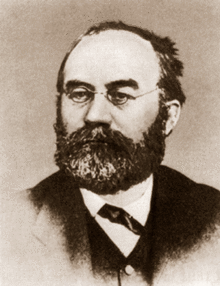Friedrich Sorge
| Friedrich Sorge | |
|---|---|

Friedrich Adolph Sorge
|
|
| Born |
9 November 1828 Bethau, Germany |
| Died | 26 October 1906 (aged 77) Hoboken, New Jersey |
| Nationality | German, American |
| Occupation | Labor leader |
Friedrich Adolph Sorge (9 November 1828- 26 October 1906) was a German communist who emigrated to the United States, where he played an important role in the labor movement.
Friedrich Adolph Sorge was born on 9 November 1828 in Bethau, Saxony, Germany, son of the Reverend Georg Sorge and Hedwig Lange. His father was a free-thinking parson, and often gave shelter to Polish revolutionaries travelling from France and Belgium to Poland. He was 19 when the revolutions of 1848 in the German states began. He joined a group of armed revolutionaries in Saxony, but they were quickly suppressed by Pomeranian troops and Sorge was forced to take refuge in Switzerland. He returned to Germany and joined the Karlsruhe Freikorp. His unit fought the Prussians in Baden and the Palatinate, losing both times. In June 1849 Sorge again took refuge in Switzerland.
Sorge was condemned to death in Germany for his role in the revolution. In 1851 he was expelled by the Swiss and moved to Belgium. In March 1852 he was expelled from Belgium and moved to London, where he caught cholera. After recovering he boarded a ship for New York, arriving in June 1852. He became a music teacher, married and settled in Hoboken, New Jersey. In 1857 he joined Albert Komp and Fritz Jacobi in forming the New York Communist Club, which was an educational society involved in the antislavery movement.
Sorge became an active socialist in 1865, after the end of the American Civil War, and soon became the leading proponent of Karl Marx's views in the United States. In December 1869 he founded Section I of New York of the International Workingmen's Association (IWMA, often called the First International), with 46 members. In December 1870 he established the Central Committee of the North American IWMA. In September 1871 Section I of the IWMA organized a demonstration of 20,000 workers, including black workers, demanding an eight-hour day and supporting the Paris Commune.
...
Wikipedia
